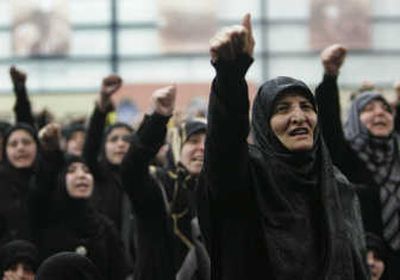Hezbollah leader calls for revenge

BEIRUT, Lebanon – Hezbollah’s leader threatened Thursday to strike Israel anywhere in the world in retaliation for what he said was its role in assassinating Imad Mughniyeh, a Hezbollah commander blamed by the United States and Israel for killing hundreds in bombings, kidnappings and hijackings over a quarter-century.
In a video speech broadcast to thousands of mourners in a spare but sprawling tent in southern Beirut, Hasan Nasrallah said that because Israel had struck beyond what he called the “traditional battlefield” of Lebanon and Israel, it risked a borderless war with the Shiite Muslim group. Israel has denied involvement in the car bombing Tuesday that killed the 45-year-old Mughniyeh in a tony neighborhood in Damascus.
“You have crossed the borders,” he said in the speech, which was vehement even by Nasrallah’s fiery standards. “Zionists, if you want this type of open war, then let it be, and let the whole world hear: We, like all other people, have a sacred right to defend ourselves, and everything we can do to defend ourselves, we will do.”
“At your service, Nasrallah!” the crowd shouted, shaking fists in the air.
Israel put its embassies and other interests abroad on alert Thursday, reinforced its troops on the Lebanese border and warned its citizens of the prospect of kidnapping. Hezbollah was last accused of attacking Israeli interests abroad in the 1990s, when Argentina implicated the group and its Iranian backers in bombings of the Israeli Embassy and a Jewish community center in Buenos Aires. Many Lebanese believe the attacks were in retaliation for Israel’s 1992 assassination of Abbas Musawi, Nasrallah’s predecessor.
Mughniyeh’s funeral came on a day that put on display the stark contrasts in a country still reeling from Hezbollah’s war with Israel in 2006 and a deepening standoff that pits the Shiite movement and its Christian allies against a coalition of Sunni Muslims, Druze and Christians gathered around the government. That 15-month confrontation has left Lebanon without a president since November and paralyzed the work of its Cabinet and parliament, marking the worst crisis since its 15-year civil war ended in 1990.
Hours before Mughniyeh’s funeral, tens of thousands of government supporters gathered in downtown Beirut’s Martyrs’ Square to mark the third anniversary of the killing of former prime minister Rafik al-Hariri. His followers blame his assassination on Syria, which denies the allegation.